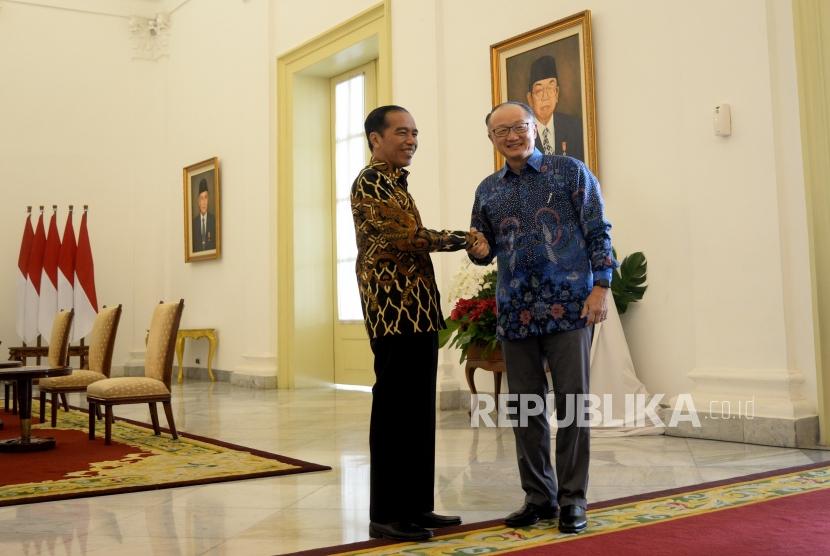REPUBLIKA.CO.ID, BOGOR -- President Joko Widodo (Jokowi) welcomed President of the World Bank Jim Yong Kim at Bogor State Palace on Wednesday (July 4). Kim along with World Bank delegation arrived at around 09.00 WIB (Indonesia West Standard Time).
Jokowi directly welcomed Kim’s arrival. They went straight to talk about the main program of Indonesia Government.
Jokowi invited Kim to utilize technology to overcome stunting, or chronic malnutrition, in children. He also explained his plan to involve private sectors and Islamic organization in the effort to reduce stunting cases.
Jokowi along with Kim and Coordinating Minister for Economic Affairs Luhut Binsar Panjaitan, Finance Minister Sri Mulyani Indrawati, Health Minister Nila F. Moeloek, Minister of Education and Culture Muhadjir Effendy, and Cabinet Secretary Pramono Anung visited the Tangkil 01 Elementary School in Sukabumi, West Java, on Wednesday to observe the progress of the government's programs to cope with stunting.
"Why do we invite the president of the World Bank? It is because they have so much experience in other countries that we hope to be discussed together. I want to highlight our stunting reduction programs by providing additional food and campaigns through 'Posyandu,'" Jokowi noted.
"Posyandu," or integrated service post, is a community-based service center for improving child survival rates and development, which is supported by a medical team.
Also read: Govt to improve nutrition to prevent stunting
Jokowi expressed hope that the programs and solutions would reduce the number of cases of stunting across Indonesia. "The point is we want to use technology, involve the private sectors, apply new innovations, and embrace Islamic mass organizations and other religious organizations to reduce the number of cases of stunting as soon as possible," the president remarked.
Meanwhile, Kim has stressed that stunting or chronic malnutrition in children should be immediately overcome as it can affect the economy of the country in future.
"Stunting is an issue in developing countries around the world. This issue is very serious, because if children with stunting are not treated as early as possible, then they will not be able to optimize their potentials and contribute to the development of this country," Kim stated
During the visit, Jokowi and Kim held a dialog with some workers at Posyandu of Kenanga 02 and mothers, who had children under five and three years of age.
Jokowi and Kim distributed books to the children at the school. In addition to holding a dialog, Jokowi and Kim sampled a banana-flavored snack bar named Pro Barz, which is non-bakery item produced by the Indonesian Science Institute.
In Indonesia, some 7.8 million of 23 million children under five, or about 35.6 percent, suffer from stunting. Of this figure, 18.5 percent of the cases of stunting are categorized as very short and 17.1 percent as short. Owing to this condition, the World Health Organization (WHO) has classified Indonesia as a country, with malnutrition status.
Stunting is a chronic nutritional problem caused by poor nutrient intake for long periods of time, generally due to inadequate dietary intake. Stunting begins in babies in their mothers' wombs and is visible when the child is two years of age.
The highest number of cases of stunting was reported in Central Sulawesi, with 16.9 percent, and the lowest in North Sumatra, with 7.2 percent.
In the National Medium-term Development Plan, the government expects to reduce the prevalence of stunting, from an initial 32.9 percent to 28 percent by 2019. To reduce the number of cases of stunting, the government has prioritized 100 districts where the cases will be addressed in the early stages. Two hundred other districts will thereafter be targeted.
Data obtained from the National Development Planning Agency indicates that malnutrition cases occur in several areas and across income groups. Thus, cases of stunting and malnutrition are not only witnessed in the low-economic class community but also the upper-middle class. This condition is due to a misunderstanding on nutritional needs for children.


